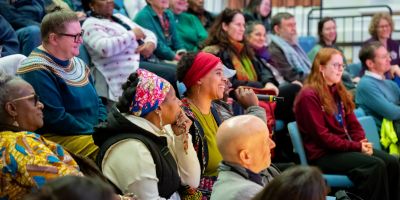Three new research themes for the Leeds Humanities Research Institute
The Leeds Humanities Research Institute has announced three research themes, for 2012-15.
The LHRI's first research themes, launching in September 2012, are:
- Cultural Exchange (led by Russell Goulbourne, School of Languages, Cultures and Societies)
- Home, Community and Belonging (led by Bridget Bennett and Hamilton Carroll, School of English)
- Cultures of Ownership/Ownership of Culture (led by Greg Radick, Graeme Gooday and Jon Topham, School of Humanities)
The themes will run for three years, and will bring together researchers from across the Faculty of Arts and beyond. To support the development of the themes, the LHRI will fund visiting speakers and workshops, will offer pump-priming funds for projects connected with the themes, and will provide administrative support as the themes gather momentum. We particularly welcome expressions of interest from postdoctoral and postgraduate researchers wishing to work in Leeds in areas connected to these themes, and expect that the LHRI themes will create a rich environment for those researchers.
Matthew Treherne, Director of the LHRI, comments that the themes will provide a spur for interdsiciplinary research in the Faculty. "We're delighted with the quality of the themes that have been proposed by colleagues. In each case, the themes promise to open up exciting new collaborations, and to help make Leeds an exciting place to study the areas selected. The selection of these areas of research is a vote of confidence in them as important topics for us as an academic community, and as areas with enormous potential for us."
Cultural Exchange
The theme of Cultural Exchange brings together colleagues from literary & cultural studies, film & visual cultures, translation studies, history, philosophy, theology and beyond, united by a shared interest in cultural exchange and transmission in a variety of circumstances, media and periods. As a first step, a series of seminars and workshops will foster far-reaching reflection on the terms and discourses of critical practice itself. How do we conceive of and talk about the relationship between past and present, between one text and another, between one culture and another? Notions of exchange and conversation will be at the heart of our theme, exploring the lively, active, multidirectional processes of meaning. Subsequently, we will aim to host a major international conference in Leeds, pursuing the metacritical debate.
Home, Community and Belonging
The category of home is a profoundly intuitive, universally significant concept; whatever their situations, cultural or religious beliefs or ethnicities, many people have a broadly similar, expansive idea of home. By examining the links between home, community, and belonging, humanities scholars can contribute new analyses of pressing national and international challenges surrounding identity, citizenship and society. Research questions relating to this topic include: What role does the imagination have to play in conceiving of relationships between home, community, and belonging? How does the experience of mobility transform a particular idea of home into one characterized by multiplicity and plurality? Is home increasingly a mythic site, belonging to a nostalgically imagined past? How do modern technologies transform our experiences of home and community? What is the relationship between, exile, diaspora, and belonging? How are contemporary processes of unhoming, and the condition of homelessness, transformative?
Cultures of Ownership/Ownership of Culture
What do we mean by ownership? What kinds of thing can be owned by individuals or collectives? What rights and obligations does ownership bring with it? Indeed what are the limits to ownership claims -- and ought some things not be subject to them? These questions come up today most pressingly under the heading of "intellectual property": copyright over artistic creations, patents on inventive knowledge etc. But current concerns belong to a broader history and a variety of traditions. The proposed theme would bring together staff and students throughout the Faculty with interests in investigating the cultural conditioning and diversity of notions of ownership, especially in relation to works of art, literature, science and other cultural productions, but also more generally. The aim would be to explore present debates from a range of perspectives and to see which intellectual frameworks and which precedents offer any guidance for moving forward.
For further information on the LHRI's research themes, please contact Matthew Treherne (m.treherne@leeds.ac.uk).




